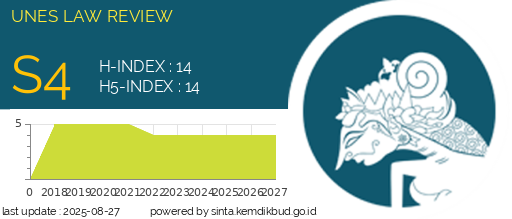JURIDICAL ANALYSIS OF THE DECISION OF THE CONSTITUTIONAL COURT NUMBER 91/PUU-XVIII/2020 ON LAW NUMBER 11 YEAR 2020
DOI:
https://doi.org/10.31933/unesrev.v5i4.584Keywords:
Legal Certainty, Constitutional Court DecisionAbstract
The interest of the people is the formation of rules that are able to accommodate the eye of the law. Article 20 paragraph (1) of the 1945 Constitution states that "The House of Representatives holds the power to make laws. The formation of a regulation carried out by the parliament is a manifestation as a state of law, the state is obliged to carry out the development of national law which is carried out in a planned, integrated and sustainable manner in the national legal system that guarantees the protection of the rights and obligations of all Indonesian people based on the Constitution of the Republic of Indonesia in 1945. This research is a normative law (doctrinal research), namely. In normative legal research, research is carried out through library research. The results of this study indicate that the Implications of the Constitutional Court Decision Number 91 of 2020 have the consequence of a formation of legislation without reflecting the principle of legal certainty and the principle of openness must be declared procedurally flawed in order to protect the public from the interests of legal product makers. The follow-up to the Constitutional Court Decision Number 91 of 2020 that tolerance for a legally defective product must not be re-applied even though the constitutional judge provides conditions as long as it is repaired for 2 (two) years, especially the Job Creation law. Thus, legal products must have concrete legal force in order to obtain legal certainty.
Downloads
References
Bambang Sunggono, 2012, Metodologi Penelitian Hukum, Jakarta : Rajawali Press
Bagir Manan, 2006. Lembaga Kepresidenan,FH UII Press. Yogyakarta
----------------, 2007, “Suatu Tinjauan Terhadap Kekuasaan Kehakiman Indonesia Dalam Undang-Undang Nomor 4 Tahun 2004, FH UII Press:Yogyakarta
-----------------, 2006, Perkembangan Pemikiran dan Pengaturan Hak Asasi Manusia di Indonesia. PT. Alumni
L. Benar L. Tanya. 2006, “Teori Hukum: Strategi Tertib Manusia Lintas Ruang dan Generasi. CV Kita: Surabaya
Mochtar Kusumaatmadja, 2002. Konsep-konsep Hukum Dalam Pembangunan, Alumni, Bandung
Peter Mahmud Marzuki. 2017. Penelitian Hukum. PT.Kharisma Putra Utama: Jakarta
Arief Sidharta, 2007. “Meuwissen Tentang Pengembangan Hukum, Ilmu Hukum, Teori Hukum dan Filsafat Hukum, PT.Refika Aditama, Bandung
Sudikno Mertokusumo, 2004. “Mengenal Hukum Suatu Pengantar”, Liberty: Yogyakarta
Undang-Undang Dasar Negara Republik Indonesia Tahun 1945
Undang-Undang Nomor 15 Tahun 2019 Tentang Perubahan Atas Undang- Undang Nomor 12 Tahun 2011 Tentang Peraturan Perundang- undangan
Undang-Undang Nomor 11 Tahun 2020 Tentang Cipta Kerja
Downloads
Published
How to Cite
Issue
Section
License
Hak cipta :
Penulis yang mempublikasikan manuskripnya di jurnal ini menyetujui ketentuan berikut:
- Hak cipta pada setiap artikel adalah milik penulis.
- Penulis mengakui bahwa UNES Law Review berhak menjadi yang pertama menerbitkan dengan lisensi Creative Commons Attribution 4.0 International (Attribution 4.0 International CC BY 4.0) .
- Penulis dapat mengirimkan artikel secara terpisah, mengatur distribusi non-eksklusif manuskrip yang telah diterbitkan dalam jurnal ini ke versi lain (misalnya, dikirim ke repositori institusi penulis, publikasi ke dalam buku, dll.), dengan mengakui bahwa manuskrip telah diterbitkan pertama kali di Jurnal UNES Law Review.



















